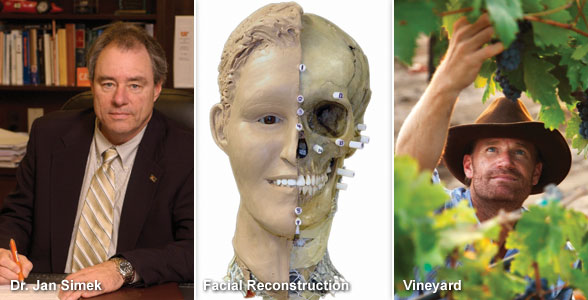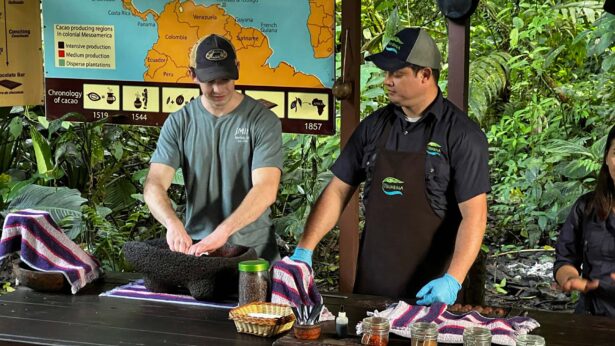Simek Takes Interim Post at Knoxville
By this time next year, Jan Simek intends to be back in his cave. But for now the distinguished professor of anthropology and expert on prehistoric cave art finds himself in the position of interim chancellor of UT Knoxville. UT president John Petersen asked Simek to step in after former chancellor Loren Crabtree resigned in January. Simek was Crabtree’s chief of staff.
Despite changes in administrative leadership, Simek says the primary mission of UT Knoxville is “unalterable”–to educate, conduct research and scholarship, disseminate knowledge, and power the economic engine of the state of Tennessee. “We are continuing Loren Crabtree’s commitment to the quality of the university,” Simek says. “The institution transcends people.”
Crabtree resigned after 7 years at UT. He and Petersen said they could not reconcile their differences about university governance structure. A search is underway for a permanent chancellor, and Simek says he thinks it is possible to have the new leader in place by the beginning of next academic year. He doesn’t intend to be a candidate, preferring to return to teaching and research in the Department of Anthropology. He has pursued his interest in archaeology in large excavations in southern France, as well as in the caves of the southeastern United States.
Simek is committed to university initiatives, including boosting student retention rates. That effort, led by Provost Bob Holub, has shown positive results, with the rate rising to 84 percent for the 2006 entering class. Simek also is continuing the intercultural awareness plan called Ready for the World.
“The university has an obligation to prepare students to succeed in a culturally diverse world,” he says. “To not do that would be to abrogate our responsibility. If universities don’t lead in areas such as this, they’re not fulfilling their obligation to society.”
Simek said faculty and student quality is at an all time high and should continue to increase. Faculty quality is evidenced by UT’s Marco Institute, a premier center for the study of medieval and Renaissance programs, and the recent selection of Dr. Jay Rubenstein to receive a MacArthur Foundation “genius” grant. Student quality also is the best ever. The current freshman class posted the highest-ever high-school grade-point averages and standardized test scores. Thirty-three percent of the freshmen had straight-A averages in high school.
Simek complimented Crabtree’s leadership. He said his predecessor had worked hard to improve the university and made a great deal of headway. “The university is on a sharply upward course, and I’m committed to doing everything I can to continue and increase it.”
Mears’s Memories
Ray Mears was one of the greatest of ÂVolunteer coaches, and his legacy is spotlighted in Ray Mears’ Big Orange Memories. The former Vol basketball coach collaborated with author Ron Bliss to produce the 208-page hardback book. More than 130 photographs illustrate the story of Mears’s basketball career. Mears is credited with coining the name “Big Orange Country” and using various promotional techniques to enhance interest in Tennessee basketball.
His Volunteer teams won three Southeastern Conference championships, and nine of his players were named All Americans. Mears died in 2007. Tennessee Valley Publishing, www.tvp1.com
Scene of the Crime
Forensic investigation–an area where UT Knoxville has a lot of expertise–has piqued the national interest. Capitalizing on the popular interest and UT’s strong programs, McClung Museum at UT Knoxville is spotlighting a forensic anthropology exhibit through May 7. The exhibit shows how forensic anthropologists determine such basic biological information as sex, ancestry, age at death, and stature from skeletal remains. It presents examples of trauma and pathology and discusses identification of individuals through skeletal information, dental evidence, and facial reconstruction.
Professors Murray Marks, Lee Meadows Jantz, and Richard Jantz of the Department of Anthropology’s forensic program have provided the museum with specimens, research data, and images to offer a primer on the subject. First Tennessee Foundation and the Lucille S. Thompson Family Foundation sponsor the exhibit.
UT’s program in forensic anthropology, begun by Dr. William Bass, is widely known around the world. Equally well known is the Anthropological Research Facility, a unique place developed by Bass, where scientists study processes of decomposition. UT also is home to the National Forensic Academy, which draws law enforcement personnel from throughout the country to study at the Anthropological Research Facility.
Museum admission is free. Hours are Monday through Saturday, 9 a.m. to 5 p.m., and Sunday, 1 to 5 p.m. Call 865-974-2144 for information or visit http://mcclungmuseum.utk.edu/.
No More Sour Grapes
A tour through wine country conjures images of France’s Bordeaux region or California’s Napa Valley, but UT Extension is working to put Tennessee’s winemaking industry on the map. “Our mission is to help people who want to start a vineyard or winery,” says Extension’s Dr. William Morris. “There’s a lot to it: climates, direction of the sun, prevailing winds, soil type, and selecting the right varieties to grow.”
Morris, a food-science specialist, has his work cut out for him in a region not known for grape production. He has been working with Extensions’s Dr. David Lockwood, a viticulturist, to help Tennessee’s winemakers gain a footing in the industry. Lockwood consults with growers about site selection and development, selection of grape varieties, and techniques in trellising, pruning, and planting. Morris advises winemakers about choosing the proper equipment, conducting lab analyses, and the appropriate use of yeast in fermentation. Since a winery produces food-grade products, Morris also advises on complying with state and federal requirements in food production facilities.
“Our role here is to get people to do things the right way,” Morris says. “A vineyard is a long-term commitment; the first harvest comes three to four years after planting. Establishing a winery requires high inputs of capital, management, and labor. It’s not something you take lightly.”
Morris is coordinator of the “Wines of the South” competition, begun in 2002 as a showcase for wines produced in Southern states. The first year featured 27 wineries from 7 states, with 205 wines. In 2006, 60 wineries from 13 states brought 433 wines.
“The competition is very helpful and vital to promoting the wine industry in Tennessee,” says Dan Collier, owner of Mountain Valley Winery in Pigeon Forge and chair of Tennessee’s Viticultural Advisory Board. “If you’re producing a product no one has ever heard of, you have to show it to the public at large. And if you can win awards, people are more inclined to try your product.”
Collier has used Morris’s and Lockwood’s services to better his product. “It’s been an ongoing relationship,” he says. “They’ve been instrumental in the expansion of the winemaking industry in Tennessee.”
Cheers! Smokey, Dance Team Are Tops
Tennessee Alumnus spotlighted Smokey, the Vol Âmascot, in its winter ’08 issue, http://alumnus.tennessee.edu/. Apparently stoked by the attention, Smokey clawed his way to the top of the national mascot heap yet again. Reigning victorious at the Universal Cheerleading Association National Championships at Walt Disney World in January, UT’s Smokey brought home the national crown for the third time.
Also grabbing a national title was the UT Knoxville dance team, which won its second straight national championship in the jazz routine. The dance team also placed fifth in the hip-hop division, and the cheer squad finished second in its division. This was the best overall finish ever by Tennessee’s spirit teams, directed by Joy Postell.
This year’s team of Smokeys is led by head Smokey Logan Durham, who is in his second year as a Smokey mascot. Other members of the mascot squad are Joel Cummings, Taylor Reynolds, and Andrew Horwat.
Song of Spring
“The arrival of whip-poor-wills in the spring, with their insistent, penetrating call, is a benchmark of the season–a herald of the warmer, even hot days to come. To the attentive naturalist, it’s a moment of such importance that most scramble to their journals to scribe, ‘first whip-poor-will of year.’ Naturalists mark the passage of time more by creaking frogs than Gregorian calendars. The nocturnal birds are enigmas. They prefer the shadowy edges of clearings in upland secessional forests and are so well camouflaged for life on the forest floor that you’d be hard pressed to find one. Mottled brown like dead leaves, they’re rarely seen; their day-to-day lives are cloaked in mystery. During mating season, however, the males must advertise their locations, which is how the females find them. Their energetic calls are sometimes repeated nonstop for hours. It’s like automatic rifle fire that splits the night into uneven pieces. The once-common whip-poor-wills are becoming harder to find throughout the East, their disappearing nocturnal cry another link to our forgotten past.”
From Natural Histories: Stories from the Tennessee Valley: Sixteen essays, accompanied by the author’s line drawings of flora and fauna, form a seasonal guide to the region’s natural life. By UT Knoxville alumnus Stephen Lyn Bales, published by University of Tennessee Press, utpress.org.
Wall Heads Health Science Center
Dr. Hershel “Pat” Wall, well known to College of ÂMedicine graduates, is the new chancellor of the UT Health Science Center. Wall had been interim chancellor and UT vice-president for health affairs since April 2007.
A chancellor search had been underway, but UT President John Petersen suspended it in December.
“We will not resume the chancellor search process until we have enhanced the appeal of the position through the joint efforts of campus leadership and our community partners,” Petersen said. “We hope the search can be re-started within the next year, and we expect to attract an exceptional leader. “We are grateful to Chancellor Wall for agreeing to assume the chancellorship until that task is completed.”
Petersen said a plan for UTHSC’s future will be rolled out in early summer. “We will continue to work with members of the legislature and the governor’s office to pursue support in meeting the funding gaps and other operating and structural needs that presently hinder our advancement. A successful Health Science Center is absolutely critical to the mission of the University of Tennessee, and we are committed to taking the steps to assure that success.”
Before accepting the role as interim chancellor, Wall was a professor and executive associate dean for admissions and student affairs. He served as interim dean for the College of Medicine from November 2005 to April 2007. Wall is a 1960 College of Medicine graduate.
The college recognized Wall as its outstanding alumnus in 1994. In 2000, he was honored by the Tennessee Chapter of the American Academy of Pediatrics as pediatrician of the year. He also has been recognized by the UT Alumni Association with awards for public service and outstanding teaching.



